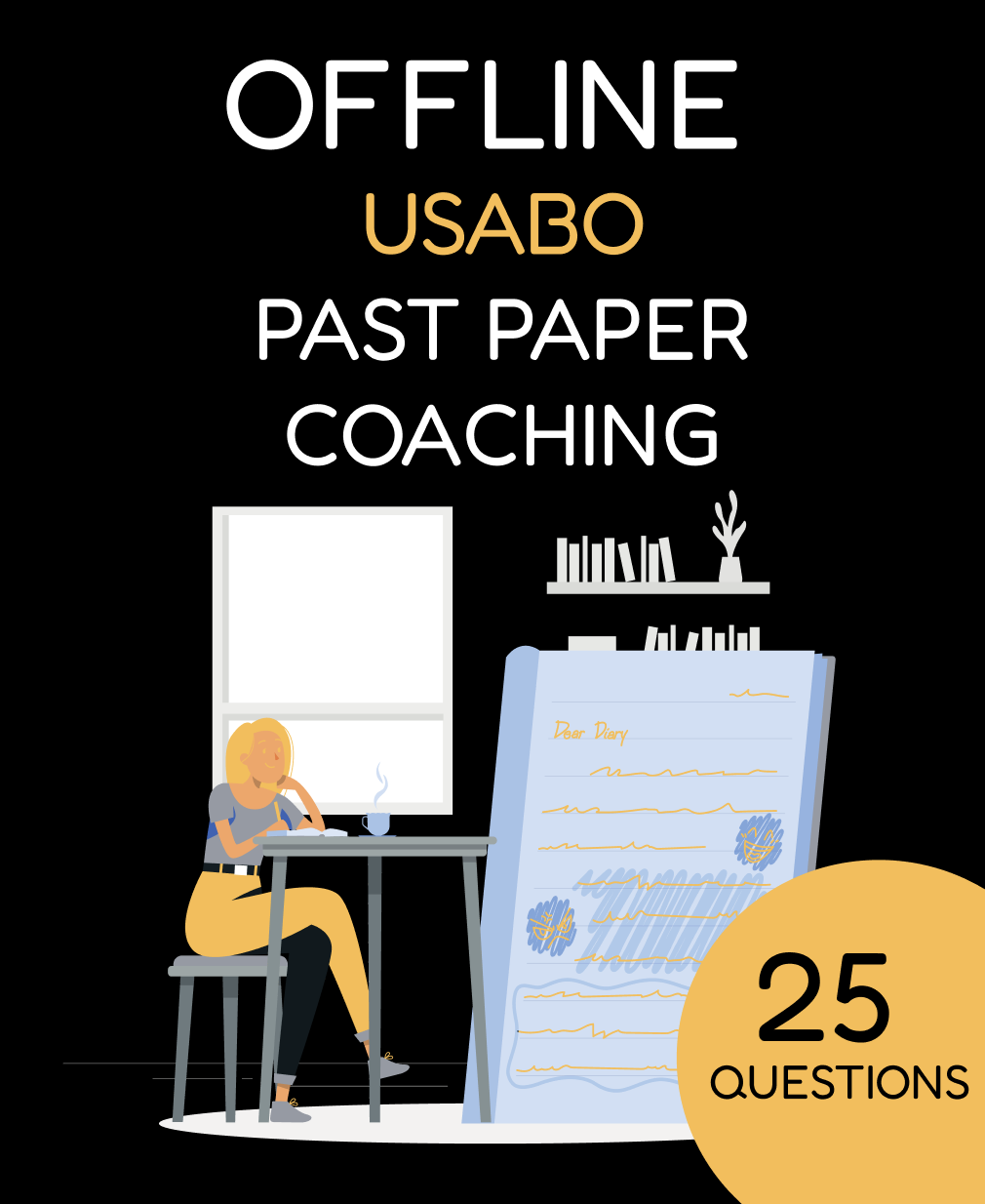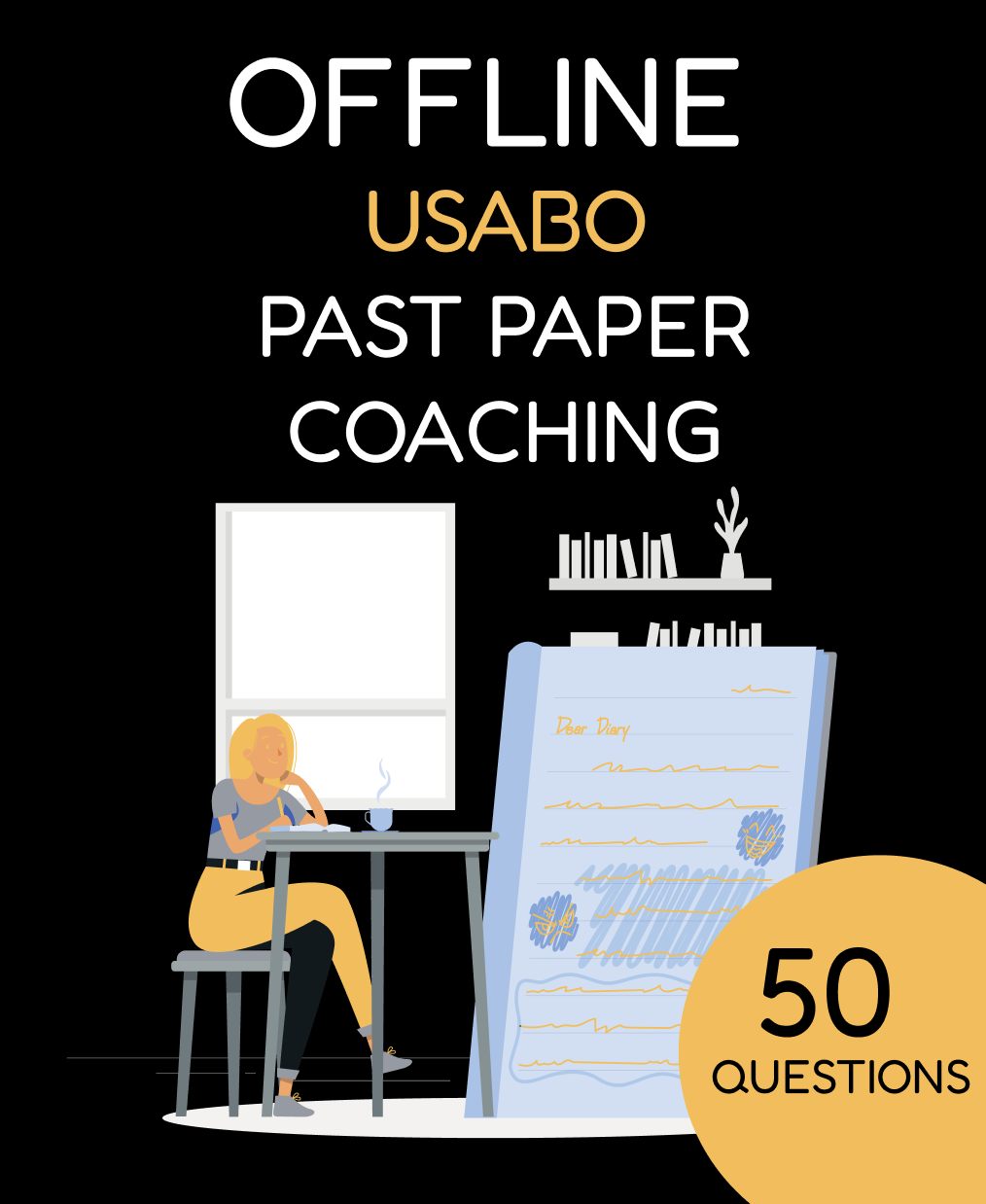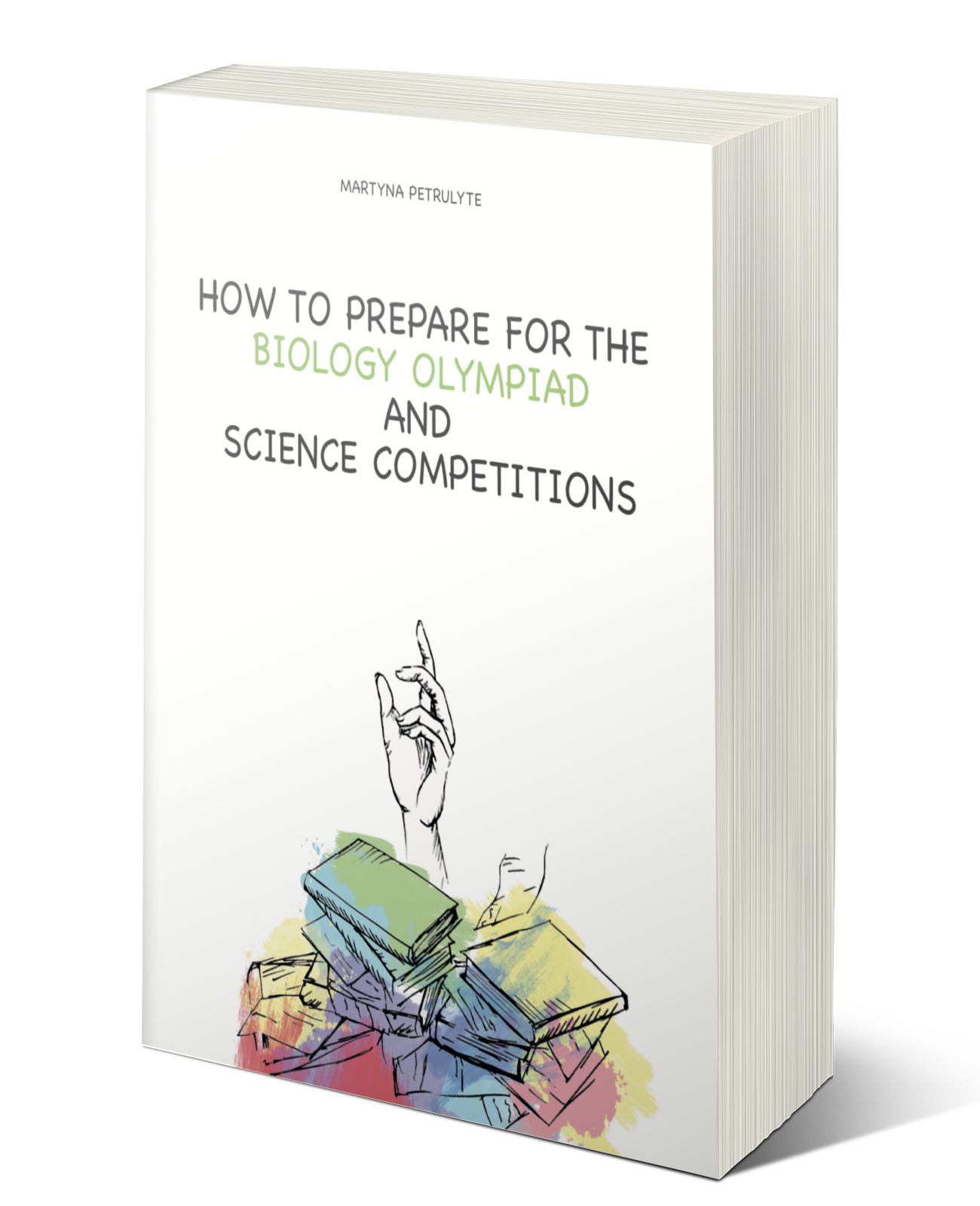As the premiere biology competition for high school students in the United States, the USA Biology Olympiad (USABO) enriches the life science education of nearly 10,000 talented students annually. It provides the motivation, curricular resources, and skills training to take them beyond their classroom experience to the level of international competitiveness.
After two rounds of challenging exams, twenty Finalists are invited to a residential training program where they learn advanced biological concepts and exacting lab skills at the USABO National Finals. Ultimately, four students earn the right as Team USA to represent the USA at the International Biology Olympiad (IBO), a worldwide competition involving student teams from over seventy countries.
More information about how to register go to https://www.usabo-trc.org/.
USABO STUDY GROUP
Don’t forget to join a USABO study group https://groups.google.com/a/biolympiads.com/d/forum/usabo-study-group

OFFLINE USABO OPEN & SEMIFINALS PAST PAPER COACHING
YOUR ULTIMATE USABO PREPARATION!
Are you aiming to excel in the USA Biology Olympiad (USABO)? BioMastery is here to guide you every step of the way! Our platform is designed specifically for aspiring biologists who want to ace the USABO with expert help and a comprehensive learning experience.
WHY CHOOSE BIOMASTERY?
🌿 Personalized Expert Support
Have a question about a past USABO paper? Sign up for USABO Past Paper coaching and submit questions through our platform, and receive clear, detailed answers from experienced USABO mentors. We ensure you not only get the correct answer but understand the underlying concepts deeply.
🧬 Interactive Learning Experience
Go beyond textbooks with our interactive explanations, diagrams, and step-by-step solutions. Develop a strong conceptual foundation and problem-solving skills tailored for USABO success.
KEY FEATURES:
- ✅ On-Demand Q&A: Submit questions 24/7 and receive personalized, in-depth responses.
- 📈 Progress Tracking: Monitor your understanding and see how you improve over time.
WHO CAN BENEFIT?
- High School Students preparing for the USABO
- Biology Enthusiasts looking to deepen their understanding
- Educators who want to supplement their teaching with real exam problems
JOIN NOW AND START YOUR JOURNEY TOWARD USABO SUCCESS!
Signing up is quick, easy. Take the first step toward mastering biology with expert guidance and a community that’s as passionate about science as you are.
FLEXIBLE PRICING PLANS TAILORED TO YOUR NEEDS
At BioMastery, we believe quality USABO preparation should be accessible and personalized. Our flexible pricing plans ensure you get expert guidance at a value that suits your goals and budget.
PRICING PACKAGES:
- 10 Questions: Perfect for students who need targeted help on specific topics or concepts.
- Access detailed, expert explanations for 10 questions from past USABO papers.
- Receive answers within 24-48 hours with personalized insights.
- 25 Questions: Ideal for more comprehensive preparation, covering multiple areas of the USABO syllabus.
- Benefit from deeper engagement and tailored feedback on a variety of question types.
- Priority response time for faster learning.
- 50 Questions: Designed for serious USABO contenders who want in-depth preparation and extensive practice.
- Detailed solutions and conceptual breakdowns for 50 questions.
- Fastest response time with priority support.
- Bonus: Access to exclusive tips and study strategies from top USABO mentors.
HOW IT WORKS:
- Choose Your Plan: Select the package that best fits your needs.
- Submit Questions: Upload questions from past USABO papers to a Google spreadsheet, one question per cell.
- Get Expert Answers: Receive clear, thorough explanations tailored to enhance your understanding.
WHY INVEST IN BIOMASTERY?
- Expert Guidance: Learn from experienced mentors who know the USABO inside and out.
- Value for Money: Flexible packages that adapt to your preparation level—no hidden fees.
- Focused Learning: Pay only for the support you need, ensuring efficient and effective study sessions.
Your USABO success story starts here. Let’s unlock your potential together! 🌱
USABO STATS AND CUT OFFS
USABO OPEN EXAM CUTOFFS
USABO SEMIFINAL EXAM CUTOFFS
USABO 2012
The Open Exam 2012 was worth 50 points, one point per question. The average score on the exam was 16.027. The highest score was 42. Students who scored 24 or higher were invited to compete in the USA Biology Olympiad Semifinal Exam.
Cut off: 24
The Semifinal Exam was worth 237 points with an average score of 90.005. The highest score was 169.
Students who scored 134 and above qualified for participation in the National Finals at Purdue University. The content of both the Semifinal and Open Exams was oriented towards selecting students for the International Biology Olympiad (IBO). Therefore, the exam questions followed the curricular guidelines of the International Biology Olympiad (IBO) organization.
USABO 2013
The score report for each student in your school who took the 2013 USA Biology Olympiad (USABO) Open Exam is found below. The Open Exam was worth 50 points, one point per question. The average score on the exam was 17.100. The highest score was 42. Students who scored 25 or higher were invited to compete in the USA Biology Olympiad Semifinal Exam.
Cut off: 28.5
General USA Biology Olympiad Information
Number of registered schools: 10, 437
Number of states represented: 44, 2 International Schools
2013 Open Exam Results
Number of students registered for the Open Exam: 7,356
Score needed to become a Semifinalist: 25
Average score (out of a possible 47): 17.1
Highest score: 42

2013 Semifinal Exam Results
Number of Semifinalists: 603
Number of schools that were represented: 199
Number of states represented in the Semifinals: 36, 1 US School in China
Total Score Results (out of a possible 208 total points)
Average score: 100.28
Highest score (one student): 164
Cutoff score (one student): 139.34

USABO 2014
In 2014, 7766 students in total registered to the USABO contest in the U.S. 6194 took the test. The highest score is 43.75 (out of 50), and the mean is 21.18. There were a total 624 semifinalists. The cutoff is 28.5.

2014 Open Exam Results
Number of students registered for the Open Exam: 7,766
Score needed to become a Semifinalist: 28.5
Average score (out of a possible 50): 21.18
Highest score: 43.75
2014 Semifinal Exam Results
Number of Semifinalists: 624
Number of schools that were represented: 211
Number of states represented in the Semifinals: 38, 1 US School in Hong Kong & 1 US School in Thailand
USABO 2015
In 2015, the report said the cutoff was 22.5.
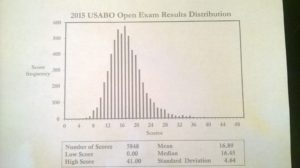
Semifinal cut-off: 142.34

USABO 2016
2016
For 2016, unofficial cutoff was approximately 23.88.
USABO 2016 Open Exam Scores

USABO 2016 Semifinal Exam Scores
USABO 2017
USABO 2017 Open exam results

USABO 2017 Semifinal results
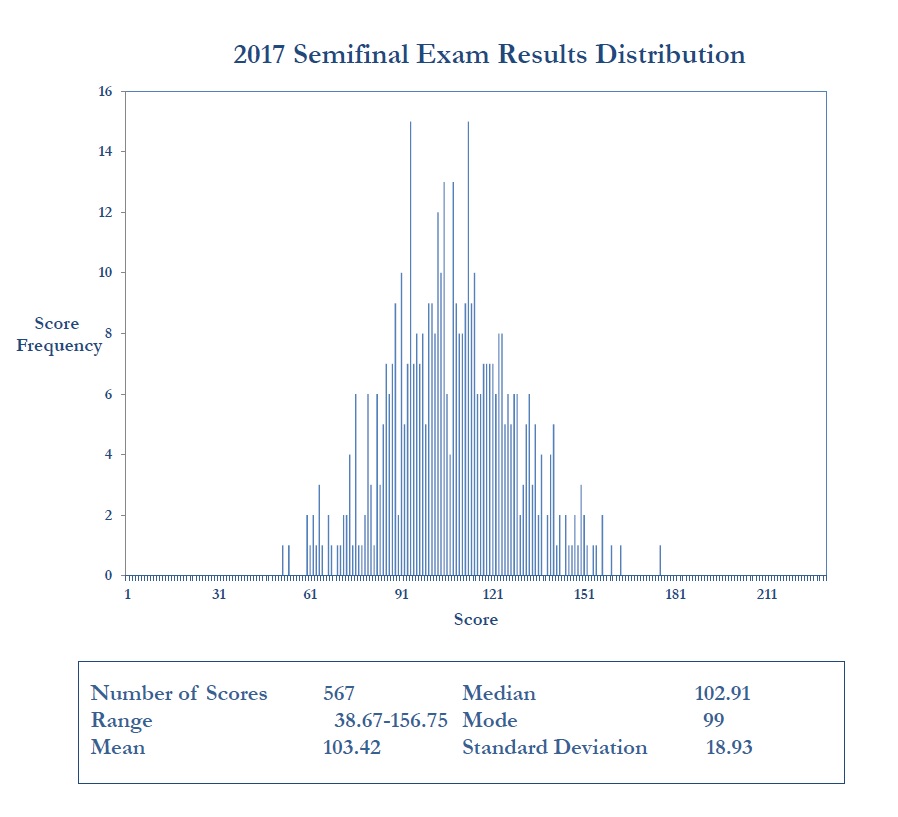

2017 Open Exam Results
Number of students registered for the Open Exam: 5, 489
Score needed to become a Semifinalist: 24.21
Average score (out of a possible 50): 17.24
Highest score: 42.58
2017 Semifinal Exam Results
Number of Semifinalists registered for the Semifinal Exam 567
Score needed to become a Finalist: 138.91
Average score (out of a possible 204): 103.43
Highest score: 156.75
Number of schools that were represented: 244
Number of states represented in the Semifinals: 36, 1 International School
USABO 2018
USABO 2018 Open Exam Results
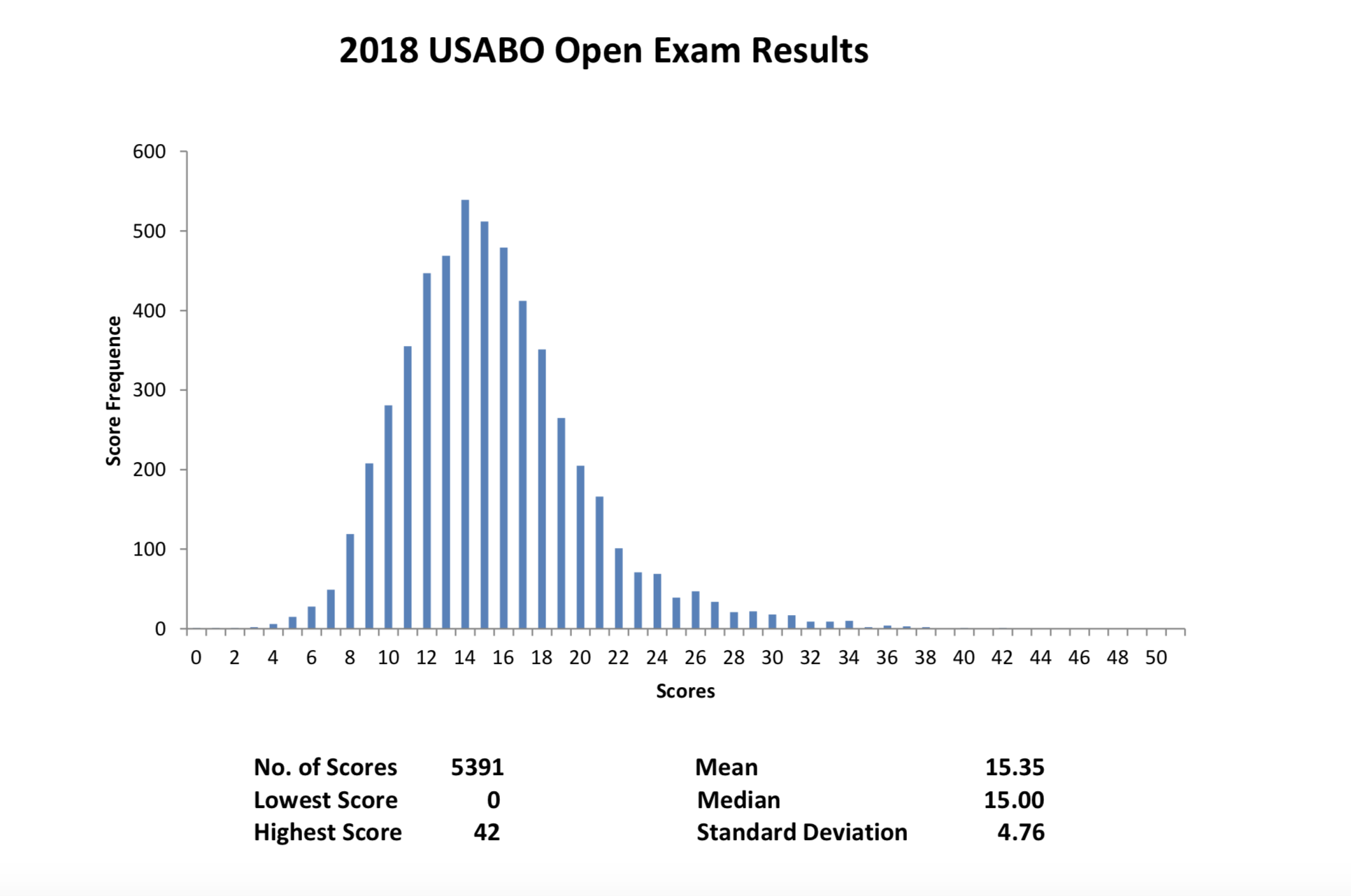
USABO 20218 Semifinal Exam Scores
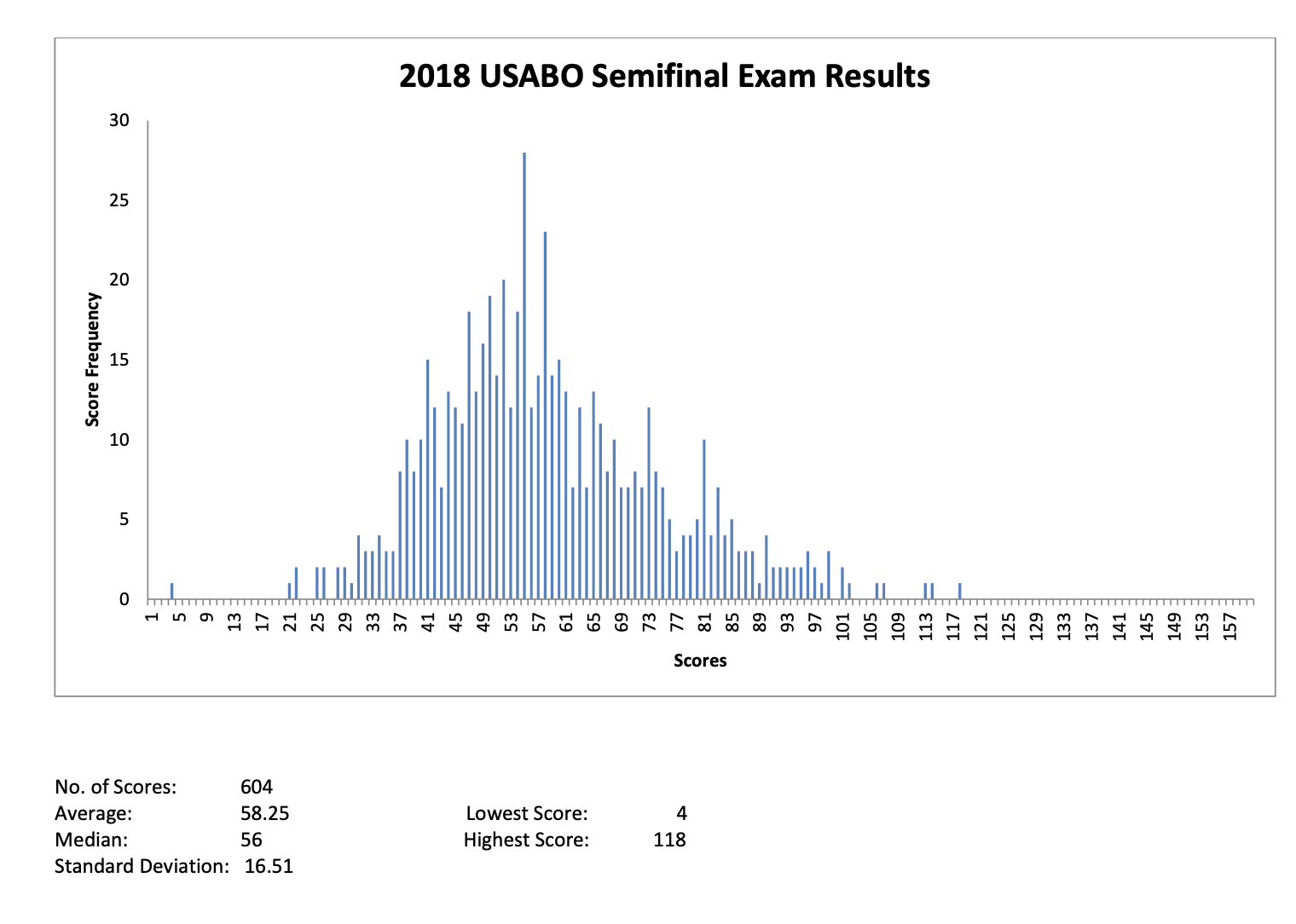
USABO 2019


USABO 2020
USABO 2020 Open Exam Scores
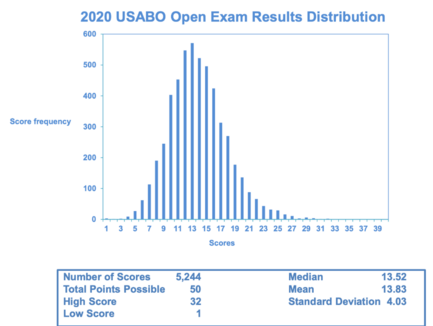

USABO 2020 Semifinal Exam Scores

USABO 2021
USABO 2021 Open results
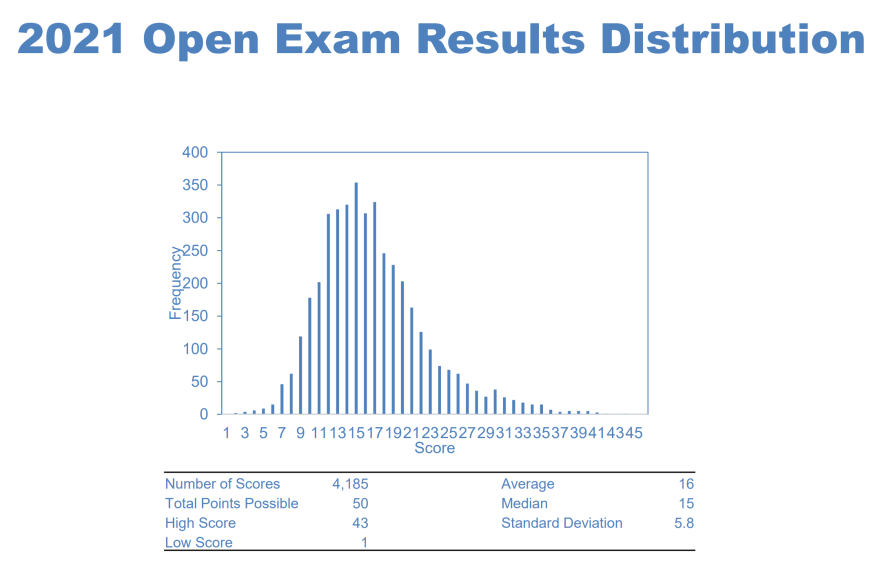
USABO 2021 Semifinal results

USABO 2022
USABO 2022 Open results
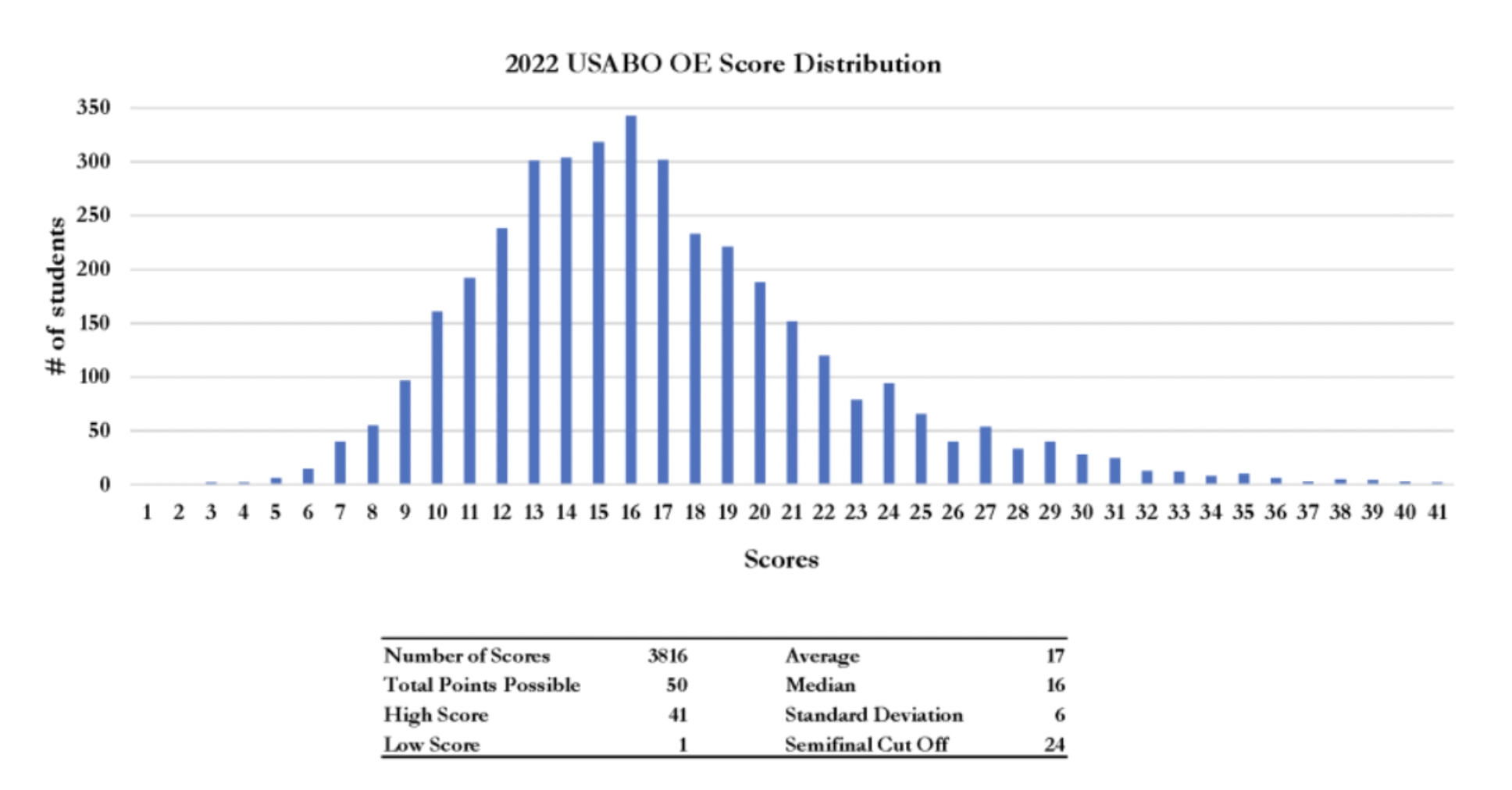
USABO 2022 Semifinal results
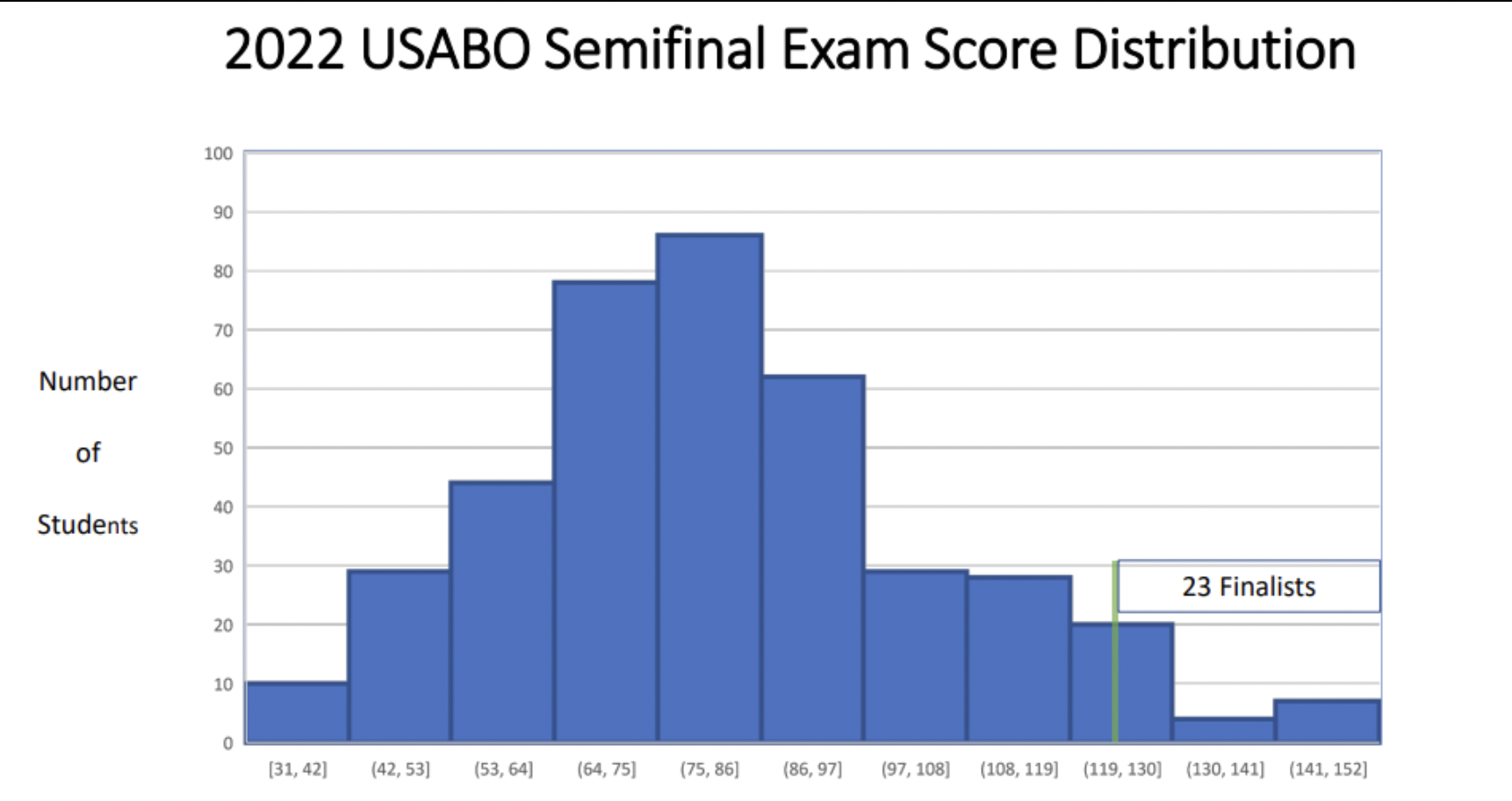

USABO 2023
USABO 2024
USABO: About the Exams
Round 1: USABO Open Exam
- Is a 50-minute, nationwide multiple-choice exam available to any high school biology student (grades 9 to 12) who is registered by a school or authorized Center.
- Administered at a registered school (classroom or location designated by the teacher/test administrator) within the time period designated by the Center for Excellence in Education (CEE).
- Structured in part like the multiple true/fase choice portion of the International Biology Olympiad (IBO) Theoretical Exam.
- Has NO Penalty for guessing.
Round 2: USABO Semifinal Exam
- Is a 120-minute exam containing three parts:
- Part A is primarily multiple choice questions with one answer.
- Part B has more complex, sequenced multiple choice and multiple true/false choice questions that may have several correct answers and may require calculations or extensive interpretation of graphs (see posted example).
- Part C may be short answer or essay.
- Administered at a registered school or authorized Center (classroom or location designated by the teacher/test administrator) over a 120-minute period within the time period designated by the Center for Excellence in Education (CEE).
- Taken by students who score in the top 10% of the Open Exam.
- Has NO Penalty for guessing. For multiple choice questions with more than one answer, the question value will be the number of wrong responses subtracted from the number of right responses with no question value below zero.
Round 3: USABO National Finals
- Conducted at a host university over a 12-day period with 10 days of instruction and two days of testing.
- Attended by students with the top 20 scores on the Semifinal Exam.
- CEE recognizes that the National Finals’ dates may conflict with high school graduation. CEE does not discourage students from attending their graduation. Special arrangements may be made by the student for a 24-hour (maximum) return to home. The student is asked to be cognizant of the fact that experience has shown missing one full day of training may be extremely detrimental to the student’s scores on the National Finals Exam and Practicals.
- Team USA will stay an additional two to three days for more training and preparation with personal instruction for the IBO Competition.
- Instruction focuses on the laboratory and conceptual understanding for all 20 Finalists.
- Activities led by university professors and experts with experience in research and undergraduate and graduate teaching assisted by former USABO Finalists.
- Evenings will be free for study with tutorials from the Teaching Assistants (all former USABO medalists or Finalists) and other activities.
- Practical is approximately 6 hours in duration and the Theoretical Exam is approximately three hours.
- Practical: laboratory-based skills, techniques, data interpretation, and real-time laboratory competency exam involving conceptual understanding and problem solving.
- Theoretical: multiple true/false choice questions and multiple choice involving interpretation of diagrams and graphs, integration of information, and data analysis.
- Practical and Theoretical Exams MUST be taken on the scheduled day. No exceptions can be made.
- Room and board are provided.
- Students are responsible for transportation to and from the USABO National Finals. Students with financial need should contact CEE should assistance be required.
- Each Finalist and his/her guardian is asked to sign an agreement to indicate support for the Finalist's advancement in the USABO competition to include full participation in Finals and the IBO competition. In addition, each Finalist and guardian signs an agreement that prohibits participation in any other national academic Olympiad or summer program, such as the Research Science Institute. In the spirit of the Olympiad, a student and his/her parent/guardian are expected to honor the commitment when they sign this agreement.
- At Finals, each student signs an agreement to obey the USABO rules. If a student breaks any one of the rules made in the USABO agreement, the student will not receive a certificate of participation or a medal. Finalists will be re-ranked accordingly.
2023 USABO Open Exam

2023 USABO Semifinal Exam

Top 50: 84.7
Honorable Mention: 68.1
Merit: 57.1


2024 USABO Open Exam



2024 USABO Semifinal Exam
2024 USABO Semifinal Exam Cutoff Scores
Recognition of Academic Excellence: Top 50
Scores: 73.5 to 123.8
Honorable Mention: to 60.5 to 73.2
Certificate of Merit 48.9 to 60.4
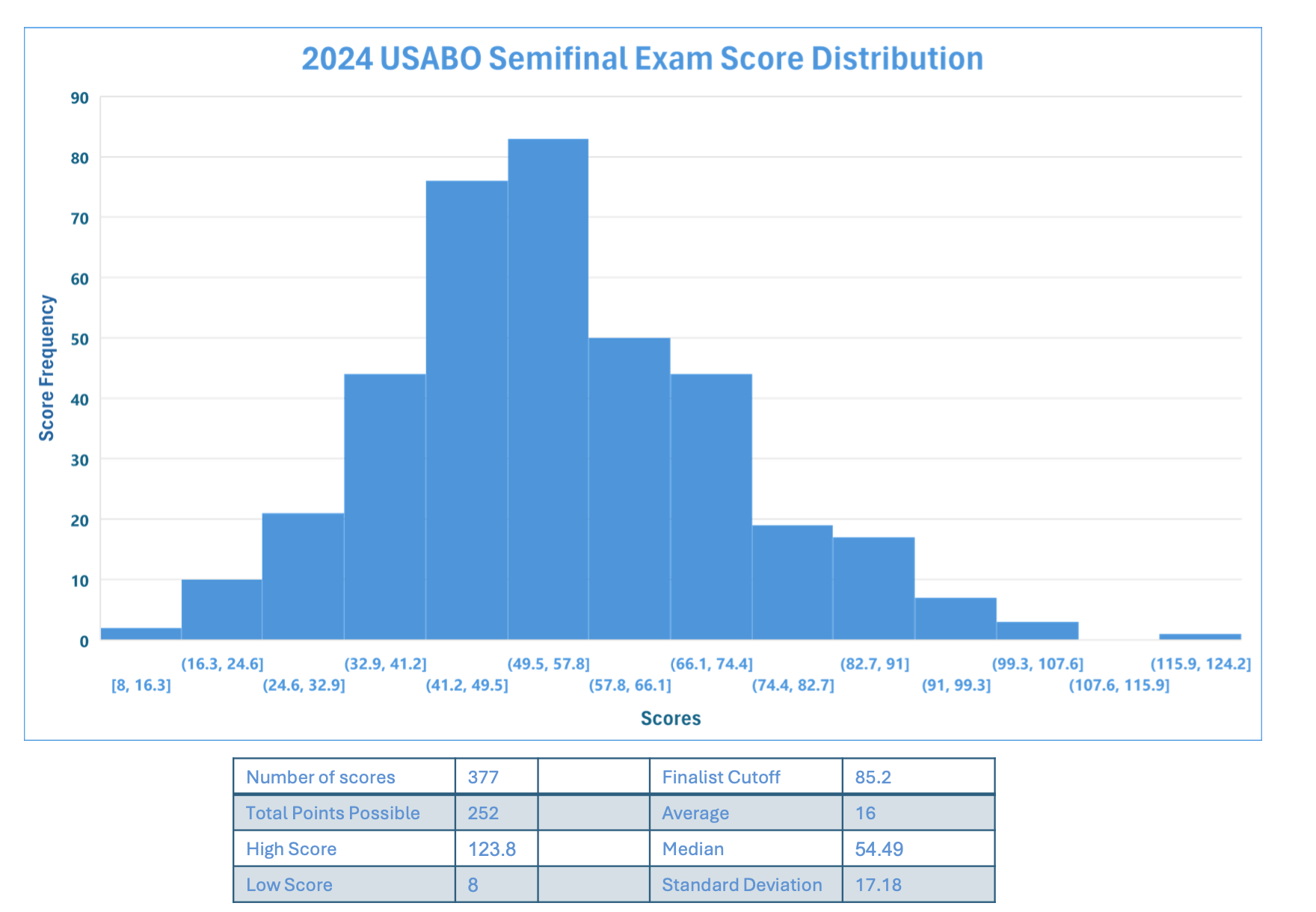
Identification and Security
- Test Administrators must have all of their students register for a Student Resource Center (SRC) account BEFORE the Open Exam.
- Prior to the USABO Open Exam, Test Administrators will receive detailed proctoring instructions by email.
- Before administering the Open Exam, Test Administrators should log into the TRC and print a roster of their students. The roster will have a unique ID number for each student who has registered for a Student Resource Center (SRC) account.
- Only students who register for a SRC account before the exam will be able to see his/her scores using his/her unique ID.
- Test Administrators will be able to see scores for all of their students based on their unique ID number.
Documentation for Open and Semifinal Exam Security
- USABO requires that all students sign and date their exam to certify their identity, acknowledge their participation in the USABO, and pledge that they have followed the rules of the competition. Exams without this information will not be considered.
- A Test Administrator will document that s/he administered the exam according to the rules of the competition and will verify the identity of those students taking the exam. Exams without this documentation will not be considered.
- Each student must be a citizen or legal permanent resident of the U.S. and be able to provide proof of US passport.
National Finalists Must Affirm
- No participation in any other 2017 International Olympiad or student research program.
- Adherence to all the rules and regulations governing the USABO and International Biology Olympaid (IBO).
- Proof of U.S. citizenship or legal permanent residency (green card).
- Proof of U.S. Passport.
- Attendance for the entire time of the National Finals.
- Attendance at the IBO if they are a USABO National Finals' gold medalist.
International Biology Olympiad
Rules and regulations are found here. The USABO is in full conformity with international regulations.
If a National Finalist who is a gold medal winner fails to follow the rules affirmed above, s/he will forfeit her/his gold medal. In the event that a National Finalist wins a gold medal and is unable to attend the IBO due to circumstances beyond her/his control, the gold medal will be retained. The highest scoring National Finals silver medalist will then become a member of Team USA and attend the IBO.
Open Exam Structure and Grading Policy
- Is a 50-minute, nationwide multiple-choice exam available to any high school biology student (grades 9 to 12) who is registered by a school or one of the select authorized USABO Centers.
- Administered at a registered school or authorized USABO Center (classroom or location designated by the teacher/test administrator) within the time period designated by the Center for Excellence in Education (CEE).
- Structured in part like the multiple true/fase choice portion of the International Biology Olympiad (IBO) Theoretical Exam.
- Has NO Penalty for guessing.
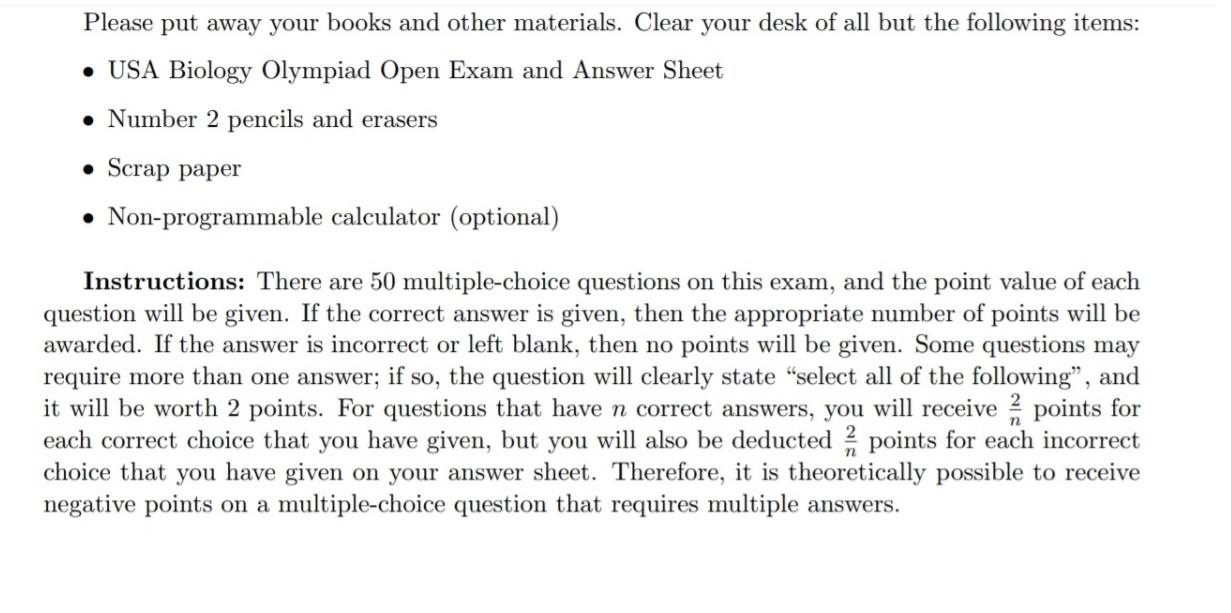
Semifinal Exam Structure and Grading Policy
Two-Hour Semifinal Exam
The USABO Semifinal Exam tests student understanding of biological concepts and critical thinking skills through multiple-choice, multiple answer, completion, matching, and short essay questions. The students have 120 minutes to complete the exam. The students determine their own pace for each of the three sections. Correct answers receive points. Incorrect answers or blank answers receive zero points.
Part A: Multiple-Choice Questions
Questions are constructed to be completed in approximately 35 to 40 minutes. Each question is worth 1 (one) point. Questions cover all seven focus areas of the USA Biology Olympiad. In reference to Bloom's Taxonomy, this section will consist of questions approximately equally distributed among the three areas of lower cognition (~60 – 70% of total) and questions testing higher levels of cognition, primarily analysis with some synthesis and evaluation (~40 – 30% of the total).
Part B: Multiple-Choice Questions
Questions are constructed to be completed in approximately 55 to 60 minutes. Each question has a two point value. Questions cover all seven focus areas of the USA Biology Olympiad. This section will focus primarily on Bloom's higher level of cognition (~70 – 80%) with some questions testing lower cognition (~30 – 20%).
Part C: Short-Answer Questions
Questions are constructed to be completed in approximately 20 to 25 minutes. Questions are worth variable points in Part C. Partial credit may be given for questions in Part C. For example, a student is asked to complete a chart with 10 cells with each cell worth 0.5 points. The student can only complete 8 of the 10 cells. The student will receive 4 points for the five point question.
general study resources
BioEd is an online educational resource for life science educators. It provides access to lesson plans, activities, lab techniques, science standards and current educational issues.
EdX offers interactive online classes and MOOCs from the world’s best universities.
Jablonski Diagram Molecular Expressions: Interactive Java tutorials.
MacMillan Learning: 106 tutorials on topics in biology.
zeroBiology: Biology quizzes, games, worksheets, dissections, and songs for students.
Flashcard Database: Site has sets of biology-related flashcards to study, capacity to develop your own, and information to download the app from iTunes.
Botany: An Introduction to Plant Biology, Fourth Edition by James D. Mauseth.
Biology: Provides comparisons in five areas of biology anatomy, botany, cellular biology, microbiology, and molecular biology.
Biology Extensive resources on content, animations, and interactive activities in the life sciences to include dissections, animals, the rainforest, and links to zoos and museums. Please note some links are not live. The site was last edited in 2009.
Mathematics Interactive tutorials, quizzes, lectures, and other resources on mathematics at high school level. Includes graphing, scatter plots, and more
Mastering Biology (Pearson): Requires registration. Used to study AP Biology.
USABO STUDY RESOURCES
SHOP


